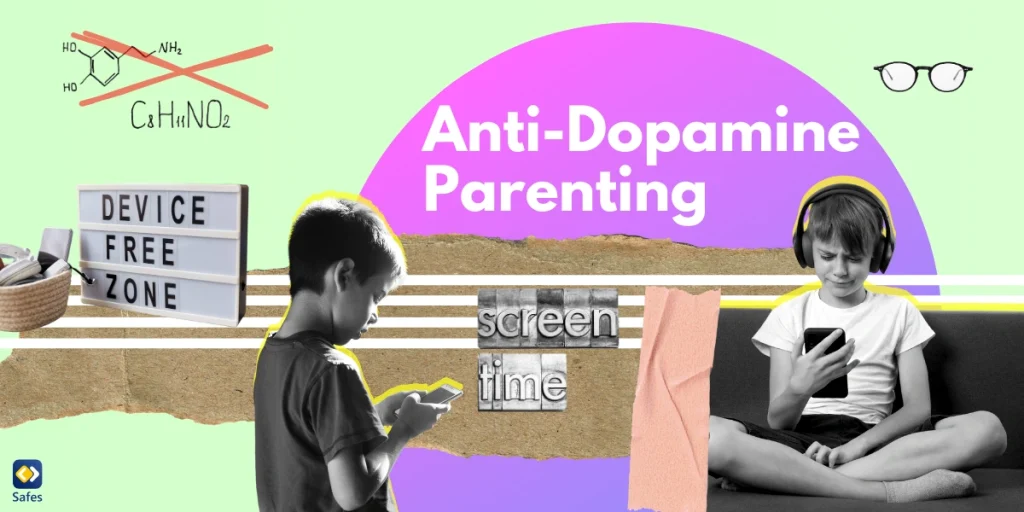Children often have a strong emotional bond with their parents when they’re kids. However, some of them won’t end up maintaining that special bond or even keeping in touch with their parents. This phenomenon is called “Adult child estrangement” where children gradually lose contact with their mother, father, or both. There are various reasons and factors leading to this family issue, which all be covered in this blog.
Download and Start Your Free Trial of the Safes Parental Control App
Moreover, if you, as a parent, are suffering from your children getting estranged from you, we’re here to help. We will explore the solutions and ways of dealing with this phenomenon while suggesting ways to prevent it in advance.
Is an Adult Child Getting Estranged from their Parents Common?
The frequency of adult children becoming estranged from their parents varies. Some studies suggest it’s relatively common, with percentages ranging from around 12% to as high as 50%. One study by Rin Reczek, Lawrence Stacey, and Mieke Beth Thomeer, Parent-Adult Child Estrangement in the United States, focused on different factors leading to family estrangement. Based on this article, 6% of people were estranged from their mothers, while 26% were estranged from their fathers, with sons more likely to distance themselves from their mothers than daughters.
Also, this study shows that sexuality, race, and gender may influence the likelihood of getting estranged from parents. According to the findings:
- Adult child estrangement is less likely for daughters than for sons.
- Among black adult children, estrangement from their mothers is less common, compared to white children. However, they are more likely to be estranged from their fathers, as reported.
- Homosexual and bisexual adult children also have more tendencies to be estranged from fathers.
What Are the Signs of Adult Child Estrangement?
Adult child estrangement may involve subtle signs that may go unnoticed. However, knowing these signs helps you prevent parental estrangement in your family. Make sure you keep an eye on these signs to figure out if you’re child is getting estranged from you.
- Decreased Communication: Noticeable reduction in communication or quality between the adult child and their parents. This could include fewer phone calls, texts, or visits.
- Avoidance of Family Gatherings: The adult child may actively avoid family gatherings or events where their parents are present, making excuses to skip or leave early.
- Emotional Distance: There may be a clear sense of emotional distance or tension between the adult child and their parents during interactions.
- No Involvement in Family Decision-Making: The adult child may feel excluded or marginalized in family decision-making processes. This can lead to a sense of detachment from family affairs.
- Negative Talk About Parents: The adult child may express negative sentiments or criticisms about their parents to others. This sign indicates unresolved issues or resentments.
- Physical Distance: Geographical distance or relocation away from parents may be a physical manifestation of estrangement.
- Refusal to Discuss Relationship Issues: The adult child may avoid discussing relationship issues with their parents or dismiss attempts at reconciliation.
- Formation of New Support Networks: The adult child may seek out alternative sources of support and companionship outside of the family. For example, they may prioritize relationships with friends or chosen family members.

Why Do Children Get Estranged from Parents?
It’s important to recognize that each estranged relationship is unique, and multiple factors may contribute to its breakdown. Effective communication, empathy, and willingness to address issues are essential in preventing and repairing estranged relationships. Here are the main reasons for adult child estrangement in adulthood along with a suggested way to fix it.
Abuse or Neglect
Emotional support and a sense of safety for children are vital. Therefore, experiencing physical, emotional, or psychological abuse or neglect from parents can lead to estrangement as a means of self-preservation and protection.
How to Prevent It?
You need to create a safe and nurturing environment for your child, seeking therapy or counseling to address past trauma. Keep your communication with your children healthy and set certain boundaries. Also, always keep an eye on signs of childhood emotional neglect to find out what behavior makes your child feel neglected.
Unresolved Conflict
Conflicts between parents and children are inevitable. However, it requires management, conversations, or other helpful ways to solve them. Persistent unresolved conflicts or issues within the parent-child relationship can create resentment and strain, eventually leading to estrangement.
How to Prevent It?
There are a few skills you need to learn to solve tensions and conflicts with children. You can practice active listening, empathy, and conflict resolution skills to address them immediately and constructively. You can also seek family therapy or mediation if needed to help understand each other better.
Parental Substance Abuse
Parents struggling with substance abuse issues may engage in harmful behaviors that negatively impact the parent-child relationship. This is one of the most important reasons leading to children falling out of touch with their parents in adulthood.
How to Prevent It?
If you or your partner are dealing with drug addiction, do not hesitate to get professional help for this issue. So, this way you can rebuild trust through consistent and sober behavior. Engage in family therapy to address underlying issues and rebuild relationships.
Boundary Violations
Those parents who don’t respect their children and their boundaries are more likely to experience an estranged child. Lack of respect for personal boundaries or intrusive behavior from parents can lead to feelings of discomfort and a desire for distance.
How to Prevent It?
Always respect your child’s autonomy and boundaries. This is probably the most important thing you can do to prevent estrangement. Also, communicate openly about expectations, respect for privacy and personal space, and seek consent before involving them in personal matters.
Emotional Unavailability
Emotionally unavailable parents who are dismissive of their children’s needs and feelings may develop feelings of neglect or abandonment. As one of the most crucial basic needs of every child, this factor plays an important role in developing parental estrangement.
How to Prevent It?
Commit to emotional availability and responsiveness, and prioritize quality time and meaningful interactions with your child. Also, consider seeking therapy or counseling to address emotional barriers and improve communication. Moreover, learn more about attention vs connection seeking behaviors in children, resulting from parents’ emotional negligence.
Life Transitions
Major life transitions, such as divorce, remarriage, or relocation, can disrupt family dynamics and strain relationships. When parents separate or divorce, children may experience feelings of confusion, loss, and instability. Divorce often involves changes in living arrangements, routines, and family dynamics, which can negatively impact parent-child relationships. Additionally, moving to a new location, whether for work, personal reasons, or retirement, can disrupt established family relationships and routines.
How to Prevent It?
Always prioritize your child’s feelings during a life transition and handle them with sensitivity and understanding. Have open communication and support during times of change, and reassure your child of your love and commitment despite external circumstances.

How to Deal with an Adult Child Estrangement?
Dealing with estranged family, especially when it’s your children losing contact with you can be emotionally challenging. It requires patience, empathy, and self-reflection, along with informed strategies. Furthermore, there’s no one solution for estrangement issues, as conditions differ from family to family. However, there are steps you can take to ease this difficult path:
- Acknowledge Your Feelings: Recognize and validate your own feelings of sadness, anger, or guilt. It’s normal to experience a range of emotions when faced with estrangement from your adult child.
- Seek Support: Reach out to trusted friends, family members, or a therapist for emotional support and guidance. Talking about your feelings with others can help you process your emotions and gain perspective on the situation.
- Reflect on the Relationship: Take time to reflect on the dynamics of your relationship with your adult child. Consider factors that may have contributed to the estrangement and be open to exploring your own role in the situation.
- Respect Boundaries: Respect your adult child’s need for space and autonomy. Do not pressure them to reconcile or show behaviors that may further strain the relationship.
- Focus on Self-Care: Take time for yourself and your well-being by doing activities that bring you joy and relaxation. Practicing mindfulness, exercising regularly, and developing healthy habits can all manage stress and maintain emotional resilience.
- Maintain Communication (if possible): If your adult child is open to communication, express your desire to reconcile and listen to their perspective without judgment. Avoid placing blame or criticizing them for their choices.
- Seek Professional Help: Do not hesitate to get help from a family therapist or mediator specializing in estrangement. A neutral third party can help facilitate communication and navigate complex emotions.
- Stay Open to Reconciliation: Remain open to the possibility of reconciliation in the future, even if it seems unlikely at present. It pays off to foster personal growth and make positive changes that may contribute to rebuilding the relationship.
Final Word
Overcoming adult-child estrangement is undoubtedly a challenging journey filled with complex emotions and uncertainties. While every estranged relationship is unique, there are universal principles that can guide us toward reconciliation and restoration. Open communication, respect for boundaries, and self-reflection can lay the foundation for rebuilding trust and developing understanding between estranged family members. Remember, reconciliation is a gradual process that requires time, effort, and mutual willingness. It’s okay to seek support from trusted friends, family members, or professionals who can offer guidance and perspective along the way.
As you are going on this journey toward healing and reconciliation, consider using resources and tools that support you in fostering healthy communication and rebuilding relationships. Safes, our innovative parental control app, offers features to promote family safety and facilitate open dialogue between parents and children. From screen time management to real-time location tracking, Safes empowers families to explore the digital world responsibly while fostering trust and communication.
You may have used iPhone Parental Controls or other devices. However, Safes provides you with the most advanced and easy-to-use options to have control over your child’s online activities. You can download the app for Android and iOS now and give our free trial a try!
Your Child’s Online Safety Starts Here
Every parent today needs a solution to manage screen time and keep their child safe online.
Without the right tools, digital risks and excessive screen time can impact children's well-being. Safes helps parents set healthy boundaries, monitor activity, and protect kids from online dangers—all with an easy-to-use app.
Take control of your child’s digital world. Learn more about Safes or download the app to start your free trial today!




